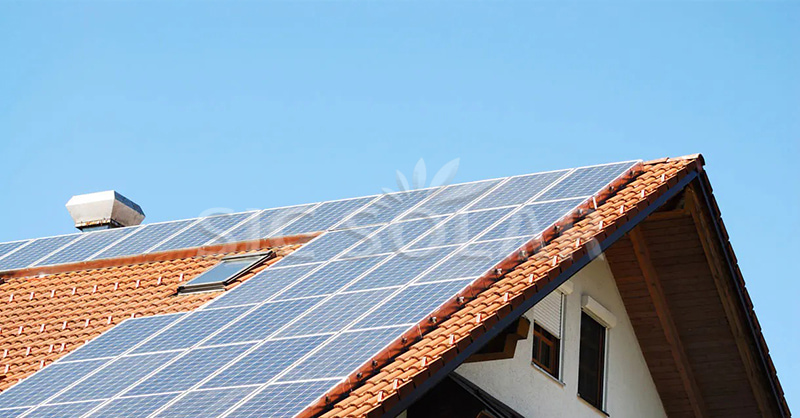Lắp đặt tấm pin mặt trời vào giá nóc xe
là giải pháp hiệu quả cho những người lái xe RV, người lái xe địa hình và những người đam mê năng lượng di động muốn thoát khỏi lưới điện. Phương pháp này mang lại sự linh hoạt, khả năng tiếp xúc với ánh sáng mặt trời tối ưu và giải phóng không gian trên mái nhà cho các mục đích sử dụng khác.
Hướng dẫn cài đặt từng bước
1. Chuẩn bị các thành phần cần thiết
-
Trước khi bắt đầu cài đặt, hãy đảm bảo bạn đã chuẩn bị sẵn những mục sau:
-
Tấm pin mặt trời cứng phù hợp với nhu cầu năng lượng của bạn.
-
Phần cứng lắp: Bu lông chữ U, giá đỡ, đai ốc và bu lông.
-
Dụng cụ: máy khoan, cờ lê, thước dây và keo trám.
-
Đồ bảo hộ: găng tay và kính an toàn.
2. Chuẩn bị giá nóc xe
-
Vệ sinh sạch sẽ giá nóc xe để loại bỏ bụi bẩn và mảnh vụn.
-
Kiểm tra giá đỡ xem có dấu hiệu hư hỏng hoặc ăn mòn nào không.
-
Lên kế hoạch bố trí các tấm pin mặt trời, đảm bảo chúng không che khuất bất kỳ đặc điểm nào trên mái nhà, chẳng hạn như lỗ thông hơi hoặc ăng-ten.
3. Vị trí các tấm pin mặt trời
-
Đặt các tấm pin mặt trời trên giá nóc xe để xác định vị trí đón ánh sáng mặt trời và vị trí khí động học tốt nhất.
-
Đánh dấu vị trí giá đỡ sẽ kết nối với tấm pin mặt trời và giá đỡ.
4. Cố định giá đỡ vào tấm pin mặt trời
-
Cố định giá đỡ vào tấm pin mặt trời bằng bu lông và đai ốc phù hợp.
-
Đảm bảo giá đỡ được căn chỉnh đúng cách và được siết chặt để tránh bị xê dịch.
5. Cố định tấm pin mặt trời vào giá nóc xe
-
Lắp tấm pin mặt trời vào giá đỡ trên nóc xe bằng giá đỡ có gắn tấm pin.
-
Cố định giá đỡ vào thanh giá nóc bằng bu lông chữ U hoặc phần cứng phù hợp khác.
-
Siết chặt tất cả các kết nối để đảm bảo tấm pin mặt trời được cố định chắc chắn và không bị dịch chuyển trong quá trình vận chuyển.
6. Định tuyến và bảo vệ dây
-
Kết nối cáp tấm pin mặt trời, đảm bảo đúng cực.
-
Đi dây cáp dọc theo giá nóc xe và cố định bằng dây buộc hoặc kẹp để tránh bị võng.
-
Bảo vệ dây khỏi tác hại của môi trường bằng ống dẫn hoặc ống bảo vệ.
7. Niêm phong và thử nghiệm
-
Bôi chất trám vào bất kỳ lỗ khoan hoặc kết nối hở nào để ngăn nước xâm nhập.
-
Kiểm tra hệ thống tấm pin mặt trời để đảm bảo nó tạo ra điện đúng cách.
Mẹo để cài đặt thành công
-
Sử dụng phần cứng chất lượng: Chọn thép không gỉ hoặc vật liệu chống ăn mòn để tăng độ bền.
-
Hãy cân nhắc đến khí động học: Đặt tấm pin mặt trời ở vị trí giúp giảm thiểu sức cản của gió, giúp cải thiện hiệu suất sử dụng nhiên liệu.
-
Lịch bảo trì: Đảm bảo các tấm pin mặt trời có thể dễ dàng tiếp cận để vệ sinh và kiểm tra.
-
Kiểm tra quy định tại địa phương: Một số khu vực có yêu cầu cụ thể về việc cải tạo xe; hãy đảm bảo tuân thủ.

Về
Năng lượng mặt trời SIC
SIC Solar là nhà sản xuất chuyên nghiệp các hệ thống lắp đặt quang điện. Chuyên môn của họ trong việc thiết kế các giải pháp lắp đặt chắc chắn và hiệu quả khiến họ trở thành đối tác đáng tin cậy cho các dự án lắp đặt năng lượng mặt trời. Bằng cách lựa chọn hệ thống lắp đặt chất lượng từ một công ty như SIC Solar, bạn có thể đảm bảo tuổi thọ và hiệu suất của hệ thống năng lượng mặt trời của mình.

 Tiếng việt
Tiếng việt